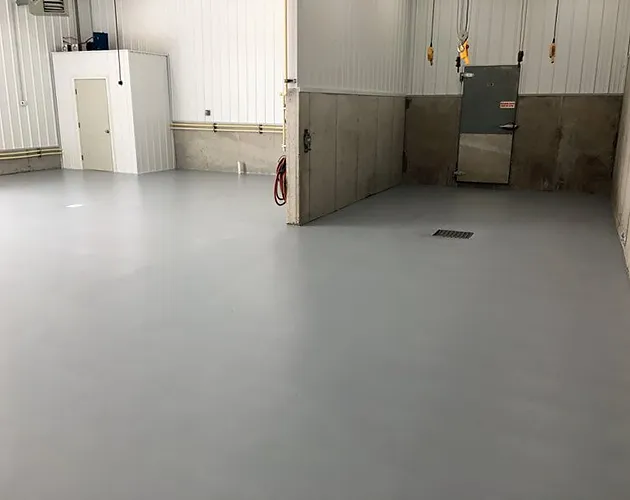Novolac Epoxy Protects PA Meat Processing Plant
Commercial epoxy coatings project near Carlisle, PA.
Specialty Coatings (Novolac Epoxy) Protects Meat Processing Plant Floor
One of the Mechanicsburg-based teams installed new coatings for a meat processing facility near Carlisle in July, 2016. The facility had already been processing beef on an unsealed floor. For this reason, the floor was cleaned by Advanced Cleaning and Restoration before the crews mechanically diamond ground the floor surface. It was cleaned again after the grinding was complete. This cleaning process degreased the floor of animal fats. Left in place, animal fats may cause fish-eyes in the coatings and future disbondment issues.
The coatings system, applied over a 3 day period, consists of:
- Coat of clear, moisture tolerant epoxy primer with low viscosity which has superior wetting properties
- Body coat of pigmented, 100% solids epoxy with a full broadcast of sand
- Top coat of pigmented, Novolac epoxy with aluminum oxide added for additional traction
The sand added to the body coat allows the coating to withstand greater impacts. It also assists with avoiding dings from dropped items and thickens the overall floor. If a decorative floor had been desired, a colored quartz would be used instead of the sand and a clear top coating would be applied. If greater coating thickness and shock absorption was desired, a second body coat with full broadcast of sand (or quartz) would be applied.
The Novolac epoxy applied over the sand acts as a highly acid resistant, protective layer. Typically in food and meet processing, highly acid cleaners are used to clean and sanitize the floor surface. These cleaners will often damage traditional aliphatic, Bisphenol A and Bisphenol F epoxies. Novolac epoxies are also used in chemical storage, battery charging areas, and brewery/distillery operations.














